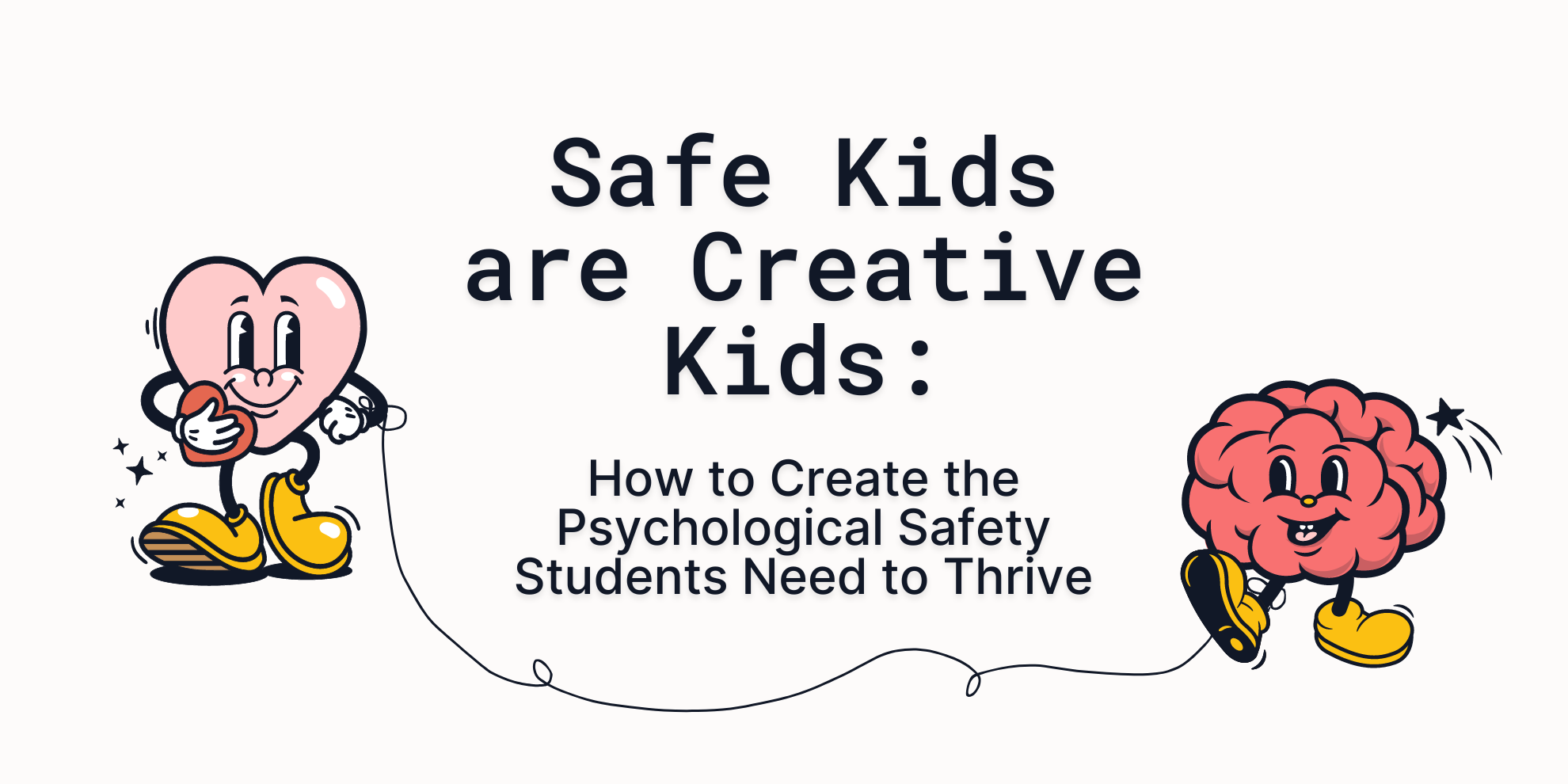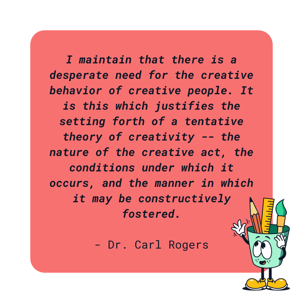How to Create the Psychological Safety Your Child Needs

Here at Curious Cardinals, we talk a lot about kids being afraid of failure. They're so used to being stacked up against Friday's test or a classmate's amazing science project -- the school environment is competitive, teachers are usually out of touch, and in general, failing or imperfection are discouraged.
The thing is, in order to be creative, curious, and engaged, you need to feel safe enough to take risks! Kids can't effectively learn when they don't feel safe. Just like you can't focus at work if you haven't had a meal or didn't get enough sleep the night before, kids can't be engaged and productive when they don't feel trust with the person they're learning from.
No passion so effectually robs the mind of all its powers of acting and reasoning as fear. - Edmund Burke
Traditional academic environments don't provide this crucial emotional support that kids need in order to thrive. Of course your student isn't willing to speak up in class or ask for help with a tough problem! The elephant in the classroom is a lack of psychological safety.
What is Psychological Safety?
Psychological safety is a concept coined by psychiatrist Carl Rogers in the 1950s, concluding that environments in which you are accepted, allowed to fail, and have no fear of punishment for mistakes, are ideal for creativity and personal growth.
mistakes, are ideal for creativity and personal growth.
Harvard Business School professor Amy Edmondson codified the idea of psychological safety with a focus on teams, discovering that when people in a group feel safe to be themselves without being rejected by the group, they are not only more productive, but the team itself is more successful. Why? Because psychological safety allows for the free-flowing of ideas. It allows you to speak up, try, fail, and retool until you get it right.
CC mentees consistently share that they feel this sense of security with their mentors. Rather than a teacher or tutor 10-20 years their senior, a CC mentor is only a few years older. Instead of being taught by a seemingly all-knowing expert, they're equal partners in learning with their mentor, figuring stuff out together. They also share similar experiences and backgrounds, so there's a sense of mutual understanding, or as our mentees would say: "My mentor gets me."
-2.png?width=298&height=298&name=events%20-%20Curious%20Cardinals%20(1)-2.png) Mentorship provides a safe space in which kids aren't afraid to ask questions, try and fail, get back up, and challenge themselves to venture out further. They feel free to speak up without fear of looking unintelligent, getting a bad grade, or being picked on.
Mentorship provides a safe space in which kids aren't afraid to ask questions, try and fail, get back up, and challenge themselves to venture out further. They feel free to speak up without fear of looking unintelligent, getting a bad grade, or being picked on.
For many kids, their CC mentor is an oasis in a desert of discomfort and judgement, providing a safe, connected relationship to discover their best self in. It's the one place they can de-mask, open up their mind, and really learn. Feeling safe and secure with their mentor helps them grow in confidence, tenacity, and become truly engaged in what they're learning. Best of all, the relationship doesn't feel transactional -- as one CC mentee shared, "It doesn't feel like an exchange of value. I really feel like my mentor cares about me." (Sounds a lot like mattering!)
Psychological safety doesn't mean sheltering kids from adversity or making them "soft". It means providing them with a trusted launching pad they can explore and learn from.
So, if we want kids to expand their minds, we first have to start with their hearts -- making them feel safe. And, while we can't guarantee psychological safety at school, on the ball field, or wherever else our kids go, we can try to facilitate it ourselves at home, and through strategically placing the right supportive individuals in our children's lives.
How to Create Psychological Safety
Dr. Rogers identified 3 key elements to creating psychological safety:
- Genuineness; To be authentic and honest about what one is thinking or feeling. Not saying what you think someone wants to hear, but being self-aware and sharing your honest perspectives with the other person.
- Acceptance; Dr. Rogers' most famous contribution to the world of psychology was the concept of "unconditional positive regard". This key to creating safety is all about making sure the person knows they hold value to you regardless of their condition. It means your respect and acceptance of that person is not based in their behavior, actions, or performance, but their intrinsic worth as a human being. Kids in particular desperately need to know they are loved and wanted unconditionally.
- Empathy; The desire to understand someone's perspectives and feelings and hold space for them. Empathy shows the person you care how they feel and you are willing to explore those tough feelings with them. Sometimes, parents and other authority figures in a child's life can unintentionally communicate they can't handle their child's big emotions, which in turn makes the child feel like they can't handle them either. The result is kids either shutting down and making themselves as small as possible, or becoming explosive and unable to healthfully manage their emotions.
In practice, these three elements can look like:
- Asking your child open-ended questions without trying to "fix" the situation or offer advice. Not "flipping out" if they share an opinion or feeling with you that you don't approve of. Just listening and validating, approaching with curiosity.
- Repeatedly affirming through your words and actions that you love your child no matter what -- that their worth in your eyes is not measured by grades, a test score, or how many touchdowns they scored at last night's game.
- Being vulnerable and sharing some of your own difficulties (in an age appropriate way, of course). For example, "I see you're really struggling with that homework assignment. You know, I actually have a really tough project I'm dealing with at work, too. I just can't seem to wrap my head around it."
- React with curiosity and compassion instead of criticism. It can be hard not to react negatively to a less-than-stellar grade on your child's report card, an opinion contrary to yours, or a confession about a poor choice they made. If you react with anger, disappointment, criticism, etc. it may make your child feel like they can't trust you with their truth -- which may make them less likely to share what they're feeling or thinking with you in the future. Try taking a breath and connecting rather than reacting. For example, a "Thank you for sharing. What happened here?" or an "I hear you. Tell me more?" can go a long way in fostering honest communication.
Dr. Timothy R. Clark expands on these ideas with his 4 stages of building psychological safety:
- Inclusion; One feels free to be their authentic self without fear of rejection.
- Learning; One feels free to ask questions and give or receive feedback without fear of ridicule.
- Contributing; One feels respected enough to make suggestions and share ideas.
- Challenging; One feels confident and secure enough to push back, express a contrary opinion, or challenge the status quo.
If you want to be the parent whose kid tells them everything, psychological safety is the key. You're creating a space within yourself and your child's environment that moves the needle from "Mom and Dad are gonna kill me if I tell them!!" to "Mom and Dad, I've got something to tell you." Your child will also be more willing to hear your advice and wisdom when they feel mentally and emotionally safe.
As we shared above, a Curious Cardinals mentor is one of those strategic individuals who can provide a sense of psychological safety for your child's learning journey that is not found in traditional school environments. With a CC mentor, kids feel empowered to ask all their curious questions, to make mistakes and keep going. Over time they don't feel intimidated, but instead confident and capable to take on tough tasks and go after what they want. Our students are building incredible passion projects, mastering their toughest academic subjects, exploring complex subject matter, and doing so all while feeling respected, cared for, and safe.
If your child doesn't have a Curious Cardinals mentor yet, you can get started here!


